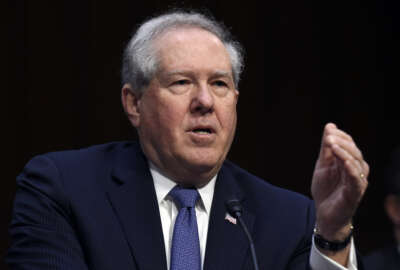DoD awards its latest batch of awards for unique research projects
Last month, the Defense Department announced $18 million in Defense Established Program to Stimulate Competitive Research or DEPSCoR awards to 28 academic teams...
Last month, the Defense Department announced $18 million in Defense Established Program to Stimulate Competitive Research or DEPSCoR awards to 28 academic teams. The teams hail from all parts of the country and the competition aims to help introduce potential researchers to DoD’s unique research challenges and supportive research ecosystem. To find out more about how it works, the Federal Drive with Tom Temin got the chance to talk to Dr. Bindu Nair, Director of DoD’s Basic Research Office and DEPSCoR Program Manager Dr. Jennifer Becker.
Interview Transcript:
Bindu Nair One of our goals in the department in general is to make sure that we’re getting the most creative ideas for technology development and seeding the most creative ideas for technology development across the country. We want to make sure that we’re getting the best of the brains that are out there, and we’re pulling them in to answering questions that we believe in the long run is going to be support the defense mission. So one of the things that we do is academic outreach in general. We have a very strong basic research program portfolio whose goal it is to make sure that we are tapping the latest science out there, understanding it, being involved in it, and also steering the direction of it. DEPSCoR was set up because one of the questions that Congress asked us is, are you in fact making sure that you get access to all ideas wherever they come from, especially because a lot of times the creativity and the ability of the department to to work with academics is based on some very close relationships with these teams of researchers in academia and the department, the program officers in the department that are asking the questions. And so this is a this can be a labor intensive activity. And so the question was, are you are you making sure that all 50 states and territories are are appropriately represented within DoD? And Congress really wanted us to make sure that we are doing outreach across the board, as well as helping us create a targeted program to make sure that in addition to outreach, we are doing a targeted programing to some of those states that perhaps traditionally haven’t received as much in the way of DoD funding in their research and development enterprise. So they gave us a formula for what states should be DEPSCoR eligible, and then we run competitions associated with those activities, that is only open to those states. But in addition to the actual DEPSCoR program. The other thing that we do, or the competitions, the other thing we do is really targeted outreach to those states. Go out and visit, like we’ve been out to visit schools that haven’t had a lot of DoD funding, bring a bunch of program officers with us so they can start building those relationships and really try to communicate how DoD works so that we can get more and more good proposals in from across the country. Very, very highly important to our undersecretary, the undersecretary of defense for research and engineering, the honorable Heidi Shu. She is being very clear with me that her goal is to make sure we tap into every scintilla of creativity, scientific creativity that the country has to offer. And this is certainly one of the programs that we use to do that. So that’s kind of the program in a nutshell. We can talk about the specifics of the program, but that’s really what we’re trying to do, and we’re well on board with what Congress has asked us to do.
Eric White Got it. And yeah, Dr. Becker, if if I can turn to you now, since you’re the manager of this of this program, how is it working out there actually on the front lines of getting these folks involved in the far reaches of the U.S.?
Jennifer Becker Yeah, I think it’s going really well. We’ve held quite a few outreach events, as Dr. Nair has mentioned. In the past year, we’ve been to West Virginia, South Dakota. We were just out in Montana. So really targeting some areas where we’ve we haven’t seen a lot of proposals and submissions across the different basic research programs. So we’re getting out there. We are talking to academic researchers, we’re taking our program officers with us to start to build those, start to develop those conversations and build connections. And we’re starting to see more and more proposals from those states. So it’s very exciting.
Eric White And in your interactions with these folks and these researchers, what has been the response when you actually make initial contact with them or when you first get to work with them?
Jennifer Becker I think many of them are surprised that the DoD invests as much as we do in truly fundamental basic research. Our program officers, our basic research program officers are very engaged and they love to be involved and to drive the science in new directions for the DoD. And I think the academic community is sometimes very surprised by that.
Bindu Nair Adding on to that I would just sort of say, I think most academics know how to write proposals to other agencies, other funding agencies. I think learning how successful people have written proposals and write proposals to DoD that I think is one of the most eye opening things for them.
Eric White And you all get and through programs like this, you’re trying to serve as a little bit of a bridge or a catalyst for helping folks get get the lingo down, right?
Bindu Nair Correct. Get the lingo down. And also. Yeah, get the lingo down. Make sure that they understand that. So we have, DEPSCoR is one of those programs that has a call, right? Like everybody by such and such a date, you have to have your white paper in. We have other programs like that, but we have a very large number of DoD programs that are open on a rolling basis. And how do you engage that? So we try to teach people more about the DoD writ large than just the DEPSCoR program.
Eric White Got it. And so let’s get into the nitty gritty, and we’ve talked about research from a wider perspective, but specifically, what kind of research are you are funding this go around and what more what we’re in those white papers that are have been selected.
Bindu Nair So I think, I will ask Jen to maybe walk you through the several projects that we have selected this year and help you with the titles and sort of what they are. I think the key to note is that we have a bunch of different program managers across the department. And what we do in the DEPSCoR program because we can’t handle, given the size of the program, we can’t handle all of them, right? We pick a few program managers each year. We take their topics and those become the DEPSCoR topics for that year. That means that if your topic doesn’t or your program manager is not in this year’s proposal that it will, your topic may show up next year. So just because something is not a DEPSCoRr program topic doesn’t mean that it is not important to the DoD. It’s just based on how we’ve met it, how we are managing the stuff that comes in. So what you’ll hear is projects based on different program managers desires. They did the selections. We provide a general guidance on what those selection criteria should be, and maybe, Jen, you can walk them through what they are.
Eric White Yes, please do Jen.
Jennifer Becker Yeah, for the for the FY 22 research collaboration competition, we had 13 different topics and they spanned anywhere from unsteady aerodynamics and turbulent flows. We had topics in electronics, electrochemistry, materials based topics, atomic and molecular physics and biological soft solid mechanics, as well as mathematical optimization. So quite the range of different topics that were available in the FY 22 funding opportunity announcement and then the proposal or yeah, the projects that we’ve selected, I mean, the list has been published and we can, we can provide that as well. But again, they are projects that are directly responsive to those topics that were in that funding opportunity announcement and span across those areas. Different basic research addressing the challenges that were outlined by those program officers.
Eric White Yeah, and I imagine they’re involved in the process of who gets selected out since they’re the ones who name the problems, I guess.
Jennifer Becker Yeah, absolutely. So DEPSCoR follows a peer review model like many of our DoD basic research programs do. So program officers across the DoD are involved in the review and selection of those proposals that are submitted, and they’re reviewed on the basis of technical merit, qualifications of the PI and relevance to DoD.
Eric White All right. And so what is the next step? They got to actually do the research, I imagine, then, and they’ll be fairly compensated for them. But have you seen that research be utilized immediately or is it just it’s added to the mountains and mountains of data that DoD has on these topics.
Jennifer Becker Yeah. So the projects are three year projects. So the first round of DEPSCoR that we funded back in 2019 are just finishing. So we’re starting to see the results from them. And there are different methods, different mechanisms to use those results. Sometimes our program officers work very closely with these investigators and connect them with DoD labs and we see transition of results that way. Sometimes the research results open up brand new areas of basic research to pursue, and the result will be another basic research grant to investigate a slightly new area. So we’re starting to see those results come through now.
Eric White And Dr. Nair, I’ll give you the last word on how this transfix turns to the Pentagon’s research wing’s overall mission of always bringing compelling research to the defense leaders who need it.
Bindu Nair Yeah, I think. I mean. This is both the opportunity and the challenge of basic research. Right. And this is not just DEPSCoR. DEPSCoR is just an instantiation of the way we think about basic research. And so everything about DEPSCoR, program we pull, we try to teach people how we want to do basic research. And it can take time, right? It can take time for stuff to move from basic research to a product. But we know that if we don’t do basic research, we’re not connected properly into the community of scholars that are thinking about brand new ways. And so then we’re going to be surprised by ways that that that science is moving. So if you have a huge program lined up, right, this is how we’re going to do technology development. If you’re not paying attention to the disruptions in science at the very early end, you can make some huge mistakes, costly mistakes in that in that technology development. You can also miss opportunities. And and so that’s part of what we are trying to make sure we do. We don’t need every basic research program to be successful. In fact, if we pick only basic research programs that are going to be successful, we’re probably not taking enough risk. But what we do want to do is pick be able to pick those winners in addition to a bunch of other stuff. Right. That is that is just going to slowly move the field forward. We want to pick the stuff that will give us that next GPS. We will give us the next Internet, will give us the next mRNA vaccine, because all of that comes from our basic research investment, because it just changes the way that people are doing science. And we want to be we want to be there right at the instantiation of that which we’ve done in several fields like quantum and photonics. We are right there as the new ideas are being created so we can very quickly move them in ways sometimes sometimes to classified or otherwise unacceptable programs, and sometimes just to keep, as Jen said, to keep it growing in the public sphere because it’s necessary to do so.
Copyright © 2024 Federal News Network. All rights reserved. This website is not intended for users located within the European Economic Area.
Tom Temin is host of the Federal Drive and has been providing insight on federal technology and management issues for more than 30 years.
Follow @tteminWFED






